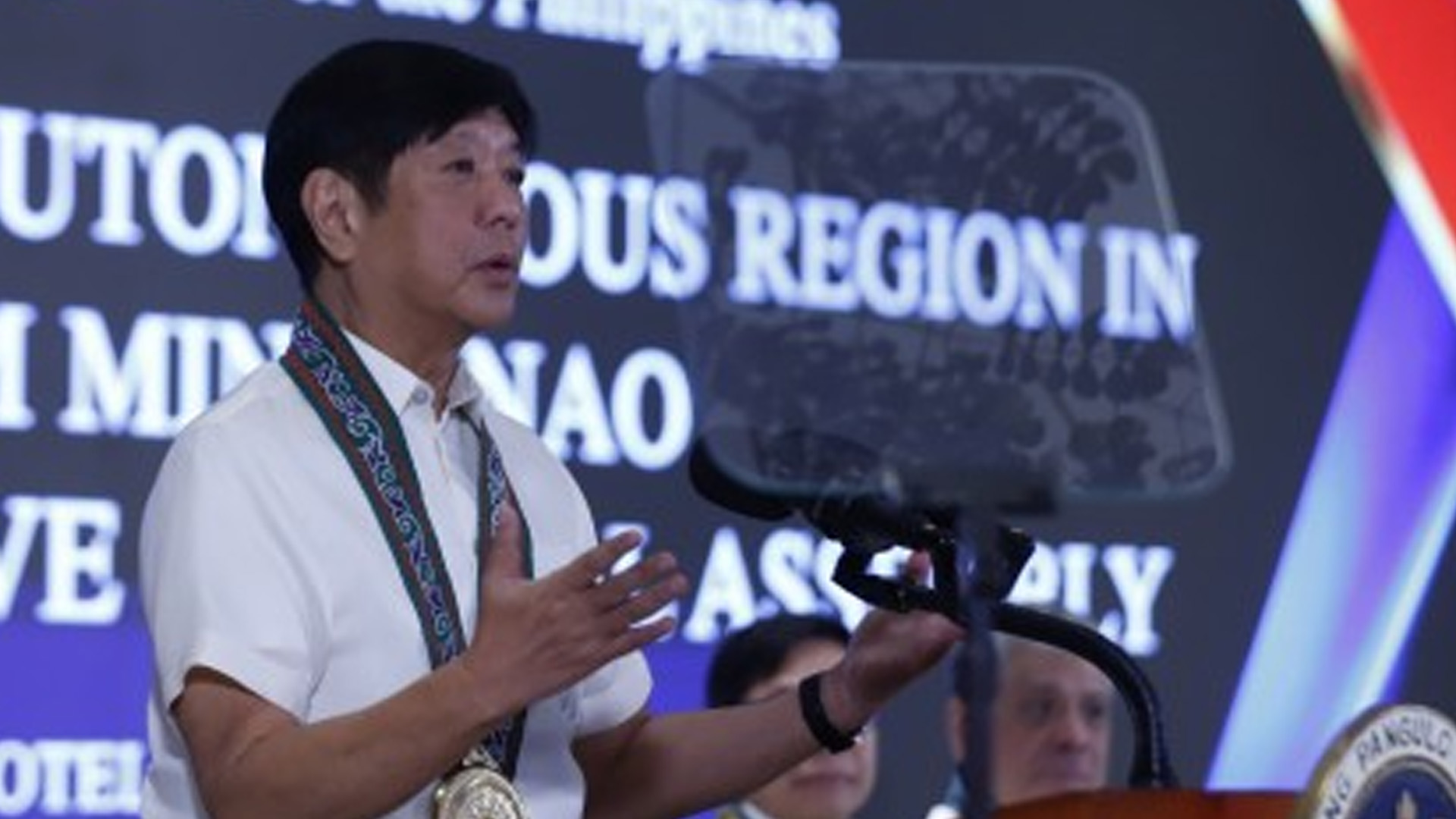The establishment of seven intergovernmental mechanisms will foster greater cooperation between the national and the Bangsamoro Autonomous Region in Muslim Mindanao (BARMM) governments, President Ferdinand R. Marcos Jr. said Tuesday.
During the inaugural BARMM Local Legislative General Assembly at the Acacia Hotel in Davao City, Marcos emphasized the importance of the activation of mechanisms to ensure the Bangsamoro parliament’s efficient and effective implementation of rules and laws.
“This is the beginning of the process of creating the institutions that we all know are necessary so that we are not dependent on one group, we are not dependent on certain individuals alone. We are dependent on the institutions that will continue to work no matter what happens in the political sphere,” Marcos said.
“The national and Bangsamoro governments will now have greater cooperation because of these offices that have now been established. We will have greater cooperation, greater coordination and we will converge towards the realization of our shared endeavors,” he added.
The seven intergovernmental mechanisms that have been established and are now working in full swing are the Philippine Congress-Bangsamoro Parliament Forum (PCBPF); Intergovernmental Fiscal Policy Board (IFPB); Joint Body for the Zones of Joint Cooperation (JBZJC); Intergovernmental Infrastructure Development Board (IFPB); Intergovernmental Energy Board (IEB); and Bangsamoro Sustainable Development Board (BSDB); and the Council of Leaders.
Sustainable, peaceful self-governance
Marcos said the mechanisms and initiatives for BARMM are crucial in achieving peace and progress not only in the Bangsamoro region but also in the entire nation.
He assured the BARMM government of his administration’s continued support to improve the socioeconomic condition of the Bangsamoro people.
“To all our BARMM leaders, I assure you of this administration’s unwavering support for the development agenda to achieve sustainable and peaceful self-governance,” Marcos said.
“Whatever problem is in Mindanao is a Philippine problem. And that is why it requires efforts of all government to make sure that BARMM will be a success in the future.”
Acknowledging that much remains to be done, Marcos said he would support all the initiatives aimed at developing BARMM and transforming it as “a shining beacon of sustainable development in Mindanao and the rest of the Philippines”.
Marcos stressed the need to consider the experiences of other countries, considering that the organization of a BARMM government “is something that we still have to learn about.”
“It is historic and it is a landmark day because it is a measure of the progress that we have made over so many decades as we have strived for peace. We have made some false starts, we have come to some successes, but we have never come this far,” he said.
“We venture together on this collective journey. I invite each and every Filipino to significantly take part in forging our path of progress, of inclusivity, and prosperity for the Bangsamoro region and the entire nation. We have already made our first steps, all we have to do is to continue what we have started to make sure that we never waiver in our determination to succeed.”
The BARMM Local Legislative Assembly commemorates the sense of unity and empowerment fostered by the enactment of Republic Act 11054 or the BARMM Organic Law on July 26, 2018.
The assembly’s objectives include empowering the local legislature for the eventual integration of the national development agenda in BARMM, fostering coordination among various legislative leagues to align with the region’s development, and initiating a series of capability programs for the prospective advancement of local legislative bodies in the region.
Boost legislative capabilities
Lugus Vice Mayor Almedzar Hajiri of Sulu province said there is a need to learn about important principles and beliefs as well as legislation.
“There are new developments that need legislative actions. The people have elected us and with that, our authority emanates from them,” Hajiri, also the BARMM Vice Mayors’ League of the Philippines regional chairperson, said in an interview.
He said the assembly brought a sense of unity and empowerment fostered by the enactment of the BARMM Organic Law.
He said the betterment of people in BARMM is their highest consideration to craft legislation.
He thanked President Marcos for gracing the event.
“He told me that he will support and help BARMM on what projects and programs we are going to undertake as long as it will help our people,” Hajiri said.
The local legislative bodies in the BARMM are composed of 67 provincial board members, 34 vice mayors, and 1,206 councilors, including Sangguniang Kabataan chairpersons and Association of Barangay Captains president as ex-officio Sangguniang Bayan members. (PNA)







